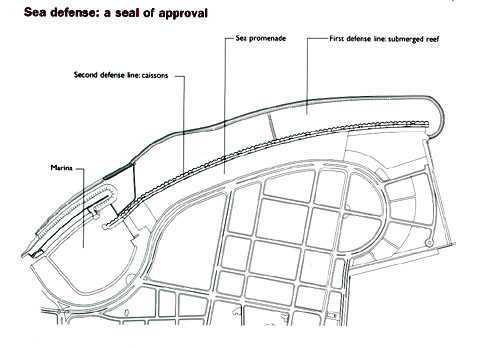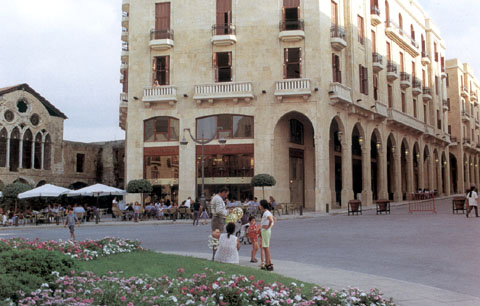
|
July - September 2000 |
 |
||
|
The
government put its seal of approval on the sea defense structure
built by SOLIDERE, as part of its 1994 agreement with the State,
represented by the Council for Development and Reconstruction (CDR).
The defense structure falls within marine works, also comprising the
construction of the Beirut Marina with a breakwater. The works ,
awarded to Bouygues in 1996, are scheduled for delivery this fall.
|
||
 |
||
 |
||
| Two
companies have trespassed on the Beirut Marina since spring 1999. In
1995, by allocating to them 11000 sq m of land to be backfilled on
the public domain, the Council of Ministers had rescinded former
authorizations to occupy areas of the maritime public domain. The
companies have ignored CDR and Transportation Ministry resolutions
ordering them to vacate the marina. Despite SOLIDERE's, requests, no effective action was taken by the authorities to evict the trespassers. SOLIDERE has taken the necessary legal measures to preserve its rights in the marina and to obtain compensation for the violations obstructing its works. The delay is also depriving the State from the income to be generated by the marina concession. The Souks of Beirut were finally given the green light. In a resolution dated September 27, 2000, the Council of Ministers sanctioned the Souks master plan, by approving related amendments to Sector E of the BCD master plan. The approval is soon to be issued by decree. The Souks of Beirut redevelopment will provide 100000 sq m of leisure and commercial facilities. SOLIDERE has finalized the project's detailed design and completed the 2500 car underground car park. The superstructure was delayed by more than a year, as SOLIDERE went through various stages of the regulatory permission process. Following approval by the Higher Council of Urbanism and Beirut Municipal Council, on March 31 and May 15, 1999, the Souks master plan was successively forwarded to the Ministers for Municipalities and Public Works and to the Council of Ministers. On July 26, 2000, the Prime Minister appointed a review committee. The two above-mentioned ministers, though having already formally approved the master plan, were on the committee, together with the Tourism Minister. The issuance of the decree should pave the way for the Souks of Beirut building permit. SOLIDERE can then proceed with the construction of the superstructure. Assuming a release of the building permit during next quarter, most facilities - gold souk, supermarket, entertainment, center, department store and multipurpose building - should be ready beginning 2002, with the souks proper following by mid-year. This will allow the closing of pre-sales covering the entire gold souk and the finalizing of leasing and management agreements for the Souks of Beirut anchor tenants and international operators. The completion of the project is bound to have a profound impact on the profitability of all central Beirut developments. The Souks of Beirut are destined to be a major magnet in the city center, perhaps even the jewel in the crown. |
||
| Master Plan Issues | ||
 |
 |
 |
| Reconstitution of the public domain | ||
| The
roads, squares and public gardens executed in accordance with
SOLIDERE's agreement with the State, shall become public domain. The
areas forming the newly reconstituted public domain, to be delivered
by the Company to the public authorities, were agreed upon in 1998
with the Mohafez (Administrator) of Beirut, based on an opinion by
the head of the Beirut Municipality legal division. In April 1999, the current Mohafez, invoking considerations of administrative authority, forwarded the procedure to the Council for Development and Reconstruction (CDR). SOLIDERE followed up on the matter with CDR and the Mohafez. In January 2000, the Prime Minister formed a committee grouping all concerned administrative authorities, to finalize the location and areas of the reconstituted public domain. Another committee was formed to resolve all obstacles to the BCD development. The meetings held by these committees have not resulted in a definitive resolution of outstanding issues. The delay in reconstituting the public domain has greatly harmed the development of the city center, by retarding the issuance of the BCD maps on a 1/500 scale, and impeding the issuance the issuance of easement and alignment certificates, as well as regulatory construction and occupation permits. Ongoing projects were obstructed and new investment discouraged. Major BCD developers formed a pressure group to deal with government-related issues. SOLIDERE itself has actively addressed matters with relevant authorities. Decree 2370, dated February 7, 2000 gave exceptional powers to the High Council of Urbanism, over a period of six months, for the interpretation of a number of the BCD master plan provisions. SOLIDERE has asked for an extension of the period. |
||
| 1/500 Maps | ||
| Upon
the Beirut Municipality's request, SOLIDERE prepared the BCD master
plan 1/500 maps and regulations and submitted them in October 1999
to CDR. The latter transmitted them to the second above-mentioned committee appointed by the Prime Minister. The approval of the plans by the Council of Ministers in the form of a decree should remove the hurdles currently hindering the issuance of construction and occupancy permits. |
||
| Easement and Alignment certificates | ||
| Easement
and alignment certificates are required for the conclusion of real
estate transactions, such as parcel subdivision and regrouping, sale
and purchase, and the release of construction and occupation
permits. Normally issued by the Municipality upon verification of conformity with the master plan, such certificates were withheld by the current Mohafez, pending the finalization of the 1/500 BCD maps. In March 2000, the Mohafez made their issuance conditional on an undertaking by concerned property owners, including SOLIDERE, not to hold the Municipality liable for any prejudice resulting from inaccuracies in the maps, and to waive all rights to claim damages in this respect. It is difficult to see how such differences might occur since the maps are to be issued with the joint signature of the Municipality and the Directorate General of Urbanism. On September 12, 2000, the Company requested the Mohafez to cancel this measure, which has in effect frozen most real estate transactions in the city center. |
||
| Construction permits | ||
 |
||
| Due
to the above hurdles, more than 24 new projects are still awaiting
approval by government agencies on various issues. Council of Ministers' decree 3862 dated September 20, 2000 has finally allowed the demolition (requested in 1999) of the old Hilton hotel structure, paving the way for its reconstruction. Three other internationally operated hotels have been delayed, pending approvals by the Directorate General of Urbanism (DGU). Minor modifications on the 'build-to-line', which controls building alignments, are delaying a prime luxury residential project, as well as three office buildings in the historic core. Permits have been totally refused in other cases, most notably a petrol car service station due to an opinion by the Ministry of Petroleum regarding petrol storage in the BCD. |
||
| Occupancy permits | ||
| The
Beirut Municipality refused in many cases to issue occupancy permits
for BCD properties after the completion of restoration works. Owners
were unable to offer, as required, proof of the pre-war legality of
their buildings, since the Municipality, itself the custodian of
these records, had lost them during the hostilities, due to fire or
other reasons. On February 11, 2000, the government released decree 2404, allowing municipal authorities to remedy any noted violations through the payment of a settlement tax. As this decree did not resolve all cases, discussions being held between the Municipality and representatives of the new owners and investors, are attempting to address these issues. |
||